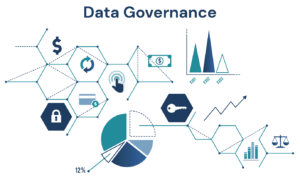Data governance establishes
Benefits Of Organizational Data Governance establishes the roles, responsibilities, and procedures for guaranteeing the responsibility and ownership of data assets in the company across the many departments and functions. Learn how data governance helps businesses. Data alone isn’t enough to make a company successful. They need high-quality information. If you don’t maintain and improve the quality of the data when it is captured, you can’t expect the data to satisfy your organization’s demands in the future.
And that is why a crucial part of data management is the Benefits Of Organizational Data Governance. If you haven’t heard of data governance, in this blog, we’ll go into further depth about what data governance is, the advantages of data governance, and why it’s not something that you can implement. It’s an obligation you can’t avoid.

What is data governance?
Data governance is an emerging discipline with a critical role in the effective management of enterprise information. Although there are many definitions, data governance is essentially a systematic approach to managing data as a strategic corporate asset. It enables an organization to understand the total value of its data, improve its data quality, and ensure that it can use the data effectively.
To apply data governance, you need to set up a clear data governance framework that everyone in your company can follow. Instead of leaving it as a vague, unwritten concept, you need to write it down and make it official. To make your data governance project work, you need to have a lot of things in place, like:
- Details on how your organization will manage its data, including roles and responsibilities for employees who will implement and maintain the data governance framework. The organization will also provide specifics on how it will manage the data.
- The agreement, collaboration, and clear definition are essential parts of a practical data governance framework.

What are the Benefits Of Organizational Data Governance?
Here are the five main benefits you can consider if you spend time and money on a sound data governance project.
1-Achieving and Maintaining Compliance
Many people are looking for rapid and precise replies, not only customers. Local and worldwide data privacy standards need a high degree of management and control on the part of enterprises for them to stay compliant. Considering legal penalties and processes is essential when evaluating the monetary worth of data as a result of data governance.
Poor data management might result in rules and security breaches. Due to improper classification and inadequate protection, companies risk disclosing confidential information. Because of the benefits of data governance, businesses may implement appropriate security measures and data masked tools to avoid aggravating consumers or regulatory agencies.
2-Time and money savings
The process of finding solutions should not be a time-consuming and stressful one. It is, though, if you are clueless. It has shown that 70% of firms spend at least 10 hours per week on data-related activities like looking for information. Consider what you could do with the time you’d have saved if you put it to better use.
3-Improving Availability in Real-Time
When organizations (or rather, their consumers) hurry for correct answers, the difference between chaotic and well-organized data becomes apparent. There are many advantages to data governance, but one of them is the ability to swiftly find, acquire, analyze, and distribute needed information.
Governmental data improves the quality of service businesses may provide to their clients. A corporation seems more in control when it responds to a user’s inquiry with the correct response as soon as possible.

4-Lead to Business Results
In the Benefits Of Organizational Data Governance is more than a set of procedures; it’s a set of principles. By bringing people together, it helps to standardize vocabulary and concepts. It develops common objectives and establishes a common language across the company.
By mapping the organization’s values to the data, structures like KPIs, alert rules, privacy regulations, and other data-based forms can do their job more effectively. For businesses, this approach is quite advantageous. It ensures team cohesion, improves dependability, clarifies responsibilities, facilitates cooperation, and averts misconceptions that might be expensive.
5-Increasing the efficiency of data
As we have previously stated, companies that do not adequately handle their data might face lengthy inquiries. Data processing consumes more than half of the time of the analytics teams, as we can see by looking at the teams in charge of data-related activities. In the end, this results in a disturbing outcome, as these teams cannot take advantage of the significant data insights that may significantly impact the organization.
To unleash the value of our data, we must eliminate a large number of repetitive procedures. Having all of the data in one place allows for improved decision-making, which is one of the main advantages of data governance. By using a «sufficient versions of the truth» approach, financial organizations are 41% more likely to uncover actionable data insights.

6-Strong security of data
Personal information, such as social security numbers and health records, must be safeguarded at all times. It includes while the data is in transit and when it is stored.
The ability to review your information management and security policies may help you avoid occurrences of accidental or purposeful data change or loss. In some instances, you may wish to restrict data from being transferred outside the firm or duplicated on a thumb drive. You may also want to implement suitable backup and recovery procedures.
7-Productivity boost for users
How much time does your staff spend clearing up incorrect information each day? Consider how much more productive they could be if data stewards were assigned to handle that task before it even reached their level of responsibility. Your organization may be missing out on game-changing ideas because your staff isn’t allowed to work to their most total capacity.
Why data governance?
Data governance is the process of developing and enforcing policies and best practices for collecting and managing data. Data governance initiatives have proven challenging for many organizations, but more are coming around to their value.
Benefits Of Organizational Data Governance is important because it helps companies make the most of their data, which has become a critical corporate asset. It also helps reduce risk by ensuring that data is clean, consistent, and accurate.
Learn more
10 Reasons Why You Should Outsource Your Data Analytics
We are ranked as Top 30 Software Development Companies in CA